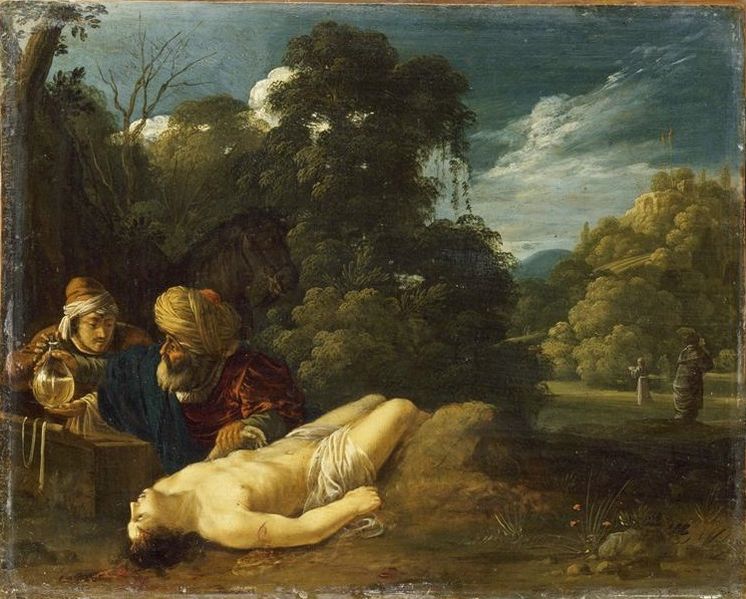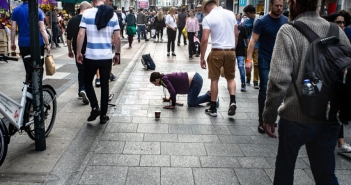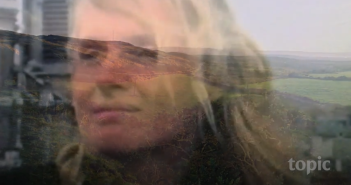Yesterday, I met George. Several times before I’d seen him working on my corner, where Pontchartrain Boulevard crosses Veterans Boulevard. For our part of New Orleans, he was unique. George was black, very black, and very strong. Very strong and yet very confined to a wheelchair. From a hundred feet down the street, I’ll tell you what stood out was how powerfully he propelled his chair.
A few days before, I’d decided I would try to get to know George. Marginalized to the grassy median, he perches on its curb, and poised there, he hopes to benefit from oncoming traffic in the left lane. So approaching that corner in the far-right turning lane, I was always too far away from George.
Over the last few years, by observation I’ve analysed the various types of our ‘corner workers’ around town. You’ll yield to the sort that wash your windshield, and find others looking for support, if you put your mind to it. I attempt to aid those in need and avoid financing the next fix for chronic alcoholics, addicts, and freeloaders. I suppose like most people, I lumped them all together, under the label ‘Bums.’
But I learned a thing or two from my daughter. Leslie developed a kind of understanding with every panhandler on Royal Street. She regularly encountered the same characters on her daily walk home. She knew them and they knew her. Sometimes Leslie doled out the odd tip, but there was always a cordial exchange. That inspired my curiosity, and I began to chat up corner-workers. Pressing a few bucks into a palm, I’d politely inquire if I could “put a name to a face” and sometimes glean a little more about their particular challenges.
So yesterday it was a little after 5 p.m. when I saw George on the far corner. I drove home, parked my car in our garage and took a $20 bill out of my wallet. That’s a far larger denomination than my typical handout. But by the time I walked back to the corner, George was gone. Like a flywheel, he reeled furiously back up Pontchartrain Boulevard and there was no way I would overtake him. But finally he paused at a spot I later learned to be his bus stop. And that’s where I gave him the cash. I told him my name and spent the next twenty minutes talking to George.
He’s not tall but his barrel chest and muscular arms are topped by a big bald head. Missing a few teeth, he’s a true entrepreneur who knows his business. George has to be, because he’s got no legs.
The right one ends just above his knee and the left is shorter. At forty-nine years of age, he’s been married to the same wife his whole life, and they have teenage children who’re doing well in school. Being on dialysis for seventeen years, he gradually lost his limbs. George lives in the 9th Ward of New Orleans where he and his wife bought their modest house years ago. He told me, ‘I wouldn’t continue if it wasn’t for my kids. I’d just be a homeless and live on the street, much easier.’
George picks his corner work-stations carefully. Our corner sees desirable drivers coming from Lakeview, an affluent neighbourhood. The traffic light is long there. I mean it remains red for an excruciating length of time. Too bad George can only “work” the first car that stops in the left lane, as wheeling in the grass isn’t a viable option. All things considered, he said it’s worth the long trip across town from his home to here, that is, to my corner. George took the bus at 5:30pm, expecting to arrive home, with luck, by 7pm. That’s quite a commute after a day’s worth of gruelling work. George is an exceptional individual. But I suspect everyone on the street has a story.
The solution to homelessness and hunger is simple. We can sink these hardships in a single stroke. Let’s provide room and board for the ignored. Raise the minimum wage and those half a million people seeking shelter will be able to afford a home. We could make quite a dent in these sobering statistics for cents on the dollar. Building safe places with public baths where people can shower, and launder their clothes in a pinch, would be a cinch. Some presidential candidates propose to eliminate poverty by instituting a universal stipend for all citizens. Why? Because the expense compares favourably to the price of programmes already on offer; those outdated doles that drain our coffers.
All we lack now is the political will, written down in black and white, up on Capitol Hill. Clearly, cost can’t be a factor, when the impact of a fairly assessed universal income tax promises a pax humana. But in the land of milk and honey, our politics are controlled by money. Money that slobbers over obstacles, when if wisely spent it will pave the way toward intelligent jobs, and deployment for the indigent. There exists plenty enough to forge a gorgeous future. For all of us. You, me and George.
Featured Image Jacob Pynas ‘The Good Samaritan.’
If you enjoyed this article you might consider purchasing our new hard copy Cassandra Voices II.
Become a part of the Cassandra Voices community through a monthly donation on Patreon.




